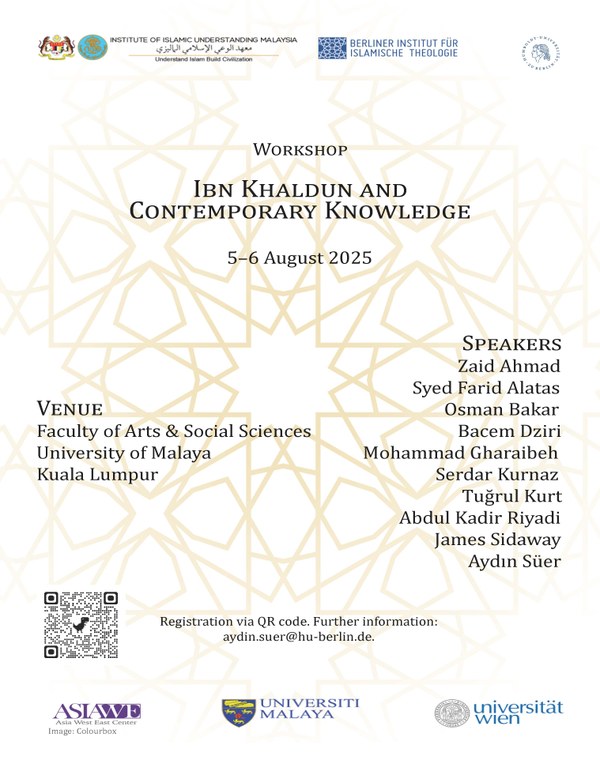EXTERN: Workshop "Ibn Khaldun and Contemporary Knowledge"
- https://www.citrs.hu-berlin.de/islamtheo_p6/de/extern-workshop-ibn-khaldun-and-contemporary-knowledge
- EXTERN: Workshop "Ibn Khaldun and Contemporary Knowledge"
- 2025-08-05T10:00:00+02:00
- 2025-08-06T17:30:00+02:00
- Wann 05.08.2025 10:00 bis 06.08.2025 17:30
- Wo The Cube, Faculty of Arts & Social Sciences, University of Malaya, Kuala Lumpur
-
iCal
Ibn Khaldun (1332–1406) is widely regarded as one of the outstanding Muslim scholars of all time. In his Muqaddima—arguably the most significant study of history in the pre-modern world—he develops groundbreaking principles of social and historical analysis. While historians before him primarily focused on documenting historical events, particularly dynastic history, in an annalistic format based on oral and later written accounts, Ibn Khaldun shifts the focus to the underlying causes of historical developments. He attributes these to social, cultural, climatic, and other structural factors.
In this regard, Ibn Khaldun lays the foundation for a new science of society (ʿilm al-ʿumrān), which does not normatively ask how a society should be but instead examines how it actually operates. This discipline is distinguished by a clearly defined object of study, an independent methodology, and a specific research agenda. What makes Ibn Khaldun’s approach particularly remarkable is his ability to conceptualize social and historical phenomena on an abstract level and extract generalizable principles from them.
However, Ibn Khaldun’s intellectual contributions extended far beyond historiography. He was deeply versed in Islamic jurisprudence and modeled his historical methodology (uṣūl al-tārīkh) on the principles of Islamic legal theory (uṣūl al-fiqh). Just as uṣūl al-fiqh provides a systematic framework for deriving legal rulings from revelation and defining sources of law, Ibn Khaldun applied a similar method to critically assess historical reports and distinguish between reliable and erroneous narratives. Additionally, he engaged extensively with systematic theology, philosophy, and Islamic mysticism, producing notably critical treatises on these subjects.
This workshop will thoroughly explore Ibn Khaldun’s intellectual framework and contextualize it within the historical and scholarly landscape of his time, with particular emphasis on medieval Islamic theology, law, philosophy, and mysticism. Given that Ibn Khaldun has often been misread or misinterpreted—especially in modern times—the workshop will examine how his thought can be incorporated into contemporary Islamic theology and across its different subfields.
Speakers
Asyiqin Ab Halim – Zaid Ahmad – Syed Farid Alatas – Osman Bakar – Bacem Dziri – Mohammad Gharaibeh – Serdar Kurnaz – Tuğrul Kurt – Abdul Kadir Riyadi – James Sidaway – Aydın Süer
Program
Download the complete program here.
Venue
The Cube
Faculty of Arts & Social Sciences
University of Malaya
Kuala Lumpur
Registration

Organized by
Berlin Institute for Islamic Theology (Humboldt University of Berlin)
Institute for Islamic-Theological Studies (University of Vienna)
Deputy Vice-Chancellor (Student Affairs; University of Malaya)
Institute of Islamic Understanding Malaysia
Asia West East Centre


